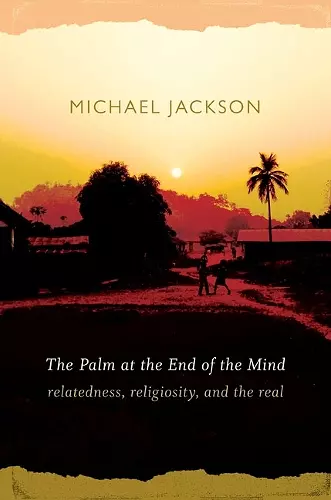The Palm at the End of the Mind
Relatedness, Religiosity, and the Real
Format:Paperback
Publisher:Duke University Press
Published:20th Feb '09
Currently unavailable, and unfortunately no date known when it will be back

Through sixty-one beautifully crafted, concise essays, anthropologist Michael Jackson reflects on life situations where we are sometimes thrown open to new ways of understanding ourselves and connecting with others
Through sixty-one beautifully crafted, concise essays, the anthropologist Michael Jackson reflects on life situations where we are sometimes thrown open to new ways of understanding ourselves and connecting with others.In many societies and for many people, religiosity is only incidentally connected with texts or theologies, church or mosque, temple or monastery. Drawing on a lifetime of ethnographic work among people for whom religion is not principally a matter of faith, doctrine, or definition, Michael Jackson turns his attention to those situations in life where we come up against the limits of language, our strength, and our knowledge, yet are sometimes thrown open to new ways of understanding our being-in-the-world, to new ways of connecting with others.
Through sixty-one beautifully crafted essays based on sojourns in Europe, West Africa, the United States, Australia, and New Zealand, and taking his cue from Wallace Stevens’s late poem, “Of Mere Being,” Jackson explores a range of experiences where “the palm at the end of the mind” stands “beyond thought,” on “the edge of space,” “a foreign song.” Moments of crisis as well as everyday experiences in cafés, airports, and offices disclose the subtle ways in which a single life shades into others, the boundaries between cultures become blurred, fate unfolds through genealogical time, elective affinities make their appearance, and different values contend.
“Michael Jackson’s sixty-one short essays, based on his experiences in disparate geographical settings, are designed to speak to each reader individually like a sophisticated musical composition, rather than advancing a linear argument. . . . Jackson’s case that ‘history, religion, spirituality, culture are shop-worn terms,’ and should be replaced by ‘the image of life at the edge of language, a shoreline on which the sea washes ceaselessly,’ is given substance by his own literary skill. And it is possible to glimpse here the makings of a shared ‘religious’ sensibility that may be fitfully emerging to unite different peoples and traditions, in ways influenced by, but not entirely decreed by, the gods of the marketplace.” - Jonathan Benthall, Times Literary Supplement
“As always . . . Jackson writes with beauty and great clarity on demanding
and elusive topics.” - Hayder Al-Mohammad, Social Anthropology
“Jackson excels at an interpretive method in which the power resides in storytelling. The Palm at the End of the Mind is a book to think with as it evokes the beauty and mystery of our experiences. Its stories haunt the imagination and so illustrate the power of phenomenology.” - REBECCA A. ALLAHYARI, Anthropology and Humanism
“The Palm at the End of the Mind is a marvelous work of deep scholarly and artistic significance. Michael Jackson reflects on those things—love, loss, pain, courage, resilience—that define the human condition. Bringing a lifetime of work in anthropology to bear, he provides a rich description of the irreducible dynamics of living in social worlds that are in continuous flux.”—Paul Stoller, author of The Power of the Between: An Anthropological Odyssey
“Elegant and harrowing, this book from renowned ethnographer Michael Jackson takes us to the borderlands of human experience, where normal habits of thought and rules of social location are lost or ruptured, ‘where we confront sides of ourselves that ordinarily do not see the light of day, yet from which new modes of consciousness may take shape.’ As Jackson moves fluidly between storytelling, poetry, memoir, metaphysics, social commentary, interior exploration, and existential reflection, we travel with him around the globe and through incongruous histories: ‘penumbral domains’ that he argues do not belong exclusively to the language of religion, or even to language itself. The Palm at the End of the Mind insists on the integrity of transmutations, even terrible ones, for these are still eternally precious and deeply true. It bears witness to the cosmic connections forged in such mystery, refusing to let us look away. Long after its last page, it haunts, it sings, it prophesies. This is a brilliant ethnography of the heart.”—Kimberley Patton, Harvard Divinity School
“As always . . . Jackson writes with beauty and great clarity on demanding and elusive topics.” -- Hayder Al-Mohammad * Social Anthropology *
“Jackson excels at an interpretive method in which the power resides in storytelling. The Palm at the End of the Mind is a book to think with as it evokes the beauty and mystery of our experiences. Its stories haunt the imagination and so illustrate the power of phenomenology.” -- Rebecca A. Allahyari * Anthropology and Humanism *
“Michael Jackson’s sixty-one short essays, based on his experiences in disparate geographical settings, are designed to speak to each reader individually like a sophisticated musical composition, rather than advancing a linear argument. . . . Jackson’s case that ‘history, religion, spirituality, culture are shop-worn terms,’ and should be replaced by ‘the image of life at the edge of language, a shoreline on which the sea washes ceaselessly,’ is given substance by his own literary skill. And it is possible to glimpse here the makings of a shared ‘religious’ sensibility that may be fitfully emerging to unite different peoples and traditions, in ways influenced by, but not entirely decreed by, the gods of the marketplace.” -- Jonathan Benthall * TLS *
ISBN: 9780822343813
Dimensions: unknown
Weight: 445g
256 pages